Well-Woman Care
Every woman—from early teens to later in life—needs to establish care with a women’s health provider.
Every Age. Every Stage.
Yearly visits with a gynecologist, certified-nurse midwife or nurse practitioner help you explore your health and make sure you’re living your healthiest life. You’ll have a chance to ask questions and understand what you can do to prevent issues. Plus, you’ll stay up to date on important screenings and vaccinations to help you stay healthy.
Caring Providers
At MetroHealth, you have options for women’s healthcare and annual visits. To schedule an appointment with a women’s healthcare provider, call 216-778-4444.
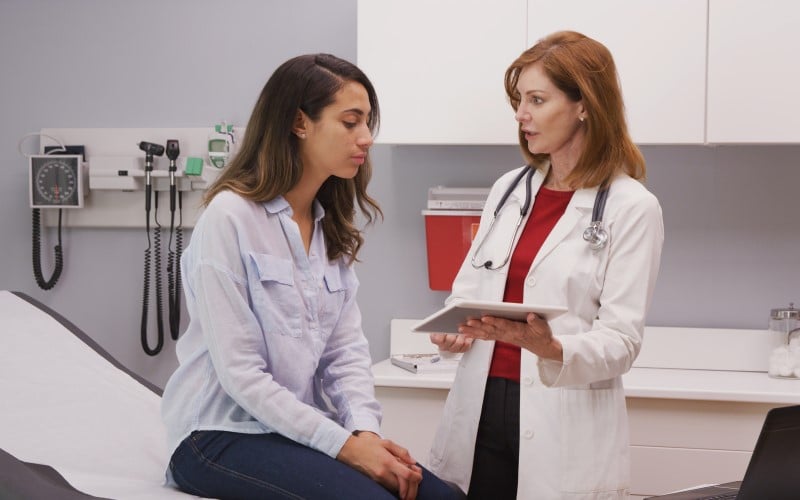
Obstetrician-Gynecologists (OB-GYN)
Obstetrician-gynecologists are physicians who are experts in women’s healthcare. With advanced clinical training, OB-GYNs provide annual exams, manage common women’s health concerns and perform procedures for issues throughout your lifetime.

Certified Nurse-Midwives
Certified nurse-midwives are another option for women’s healthcare at MetroHealth. Our certified nurse-midwives are experienced registered nurses with extensive clinical expertise. They excel at making patients feel comfortable, answering questions and forming relationships that encourage good health.
What to Expect During Annual Visits
Annual women’s healthcare visits are an opportunity for our MetroHealth providers to listen to you: your goals, your concerns and what you’re feeling.
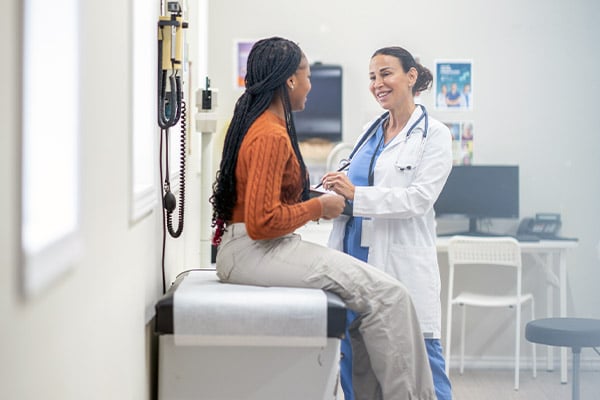
We’ll discuss:
- Nutrition
- Exercise
- Safe sex
- Mental health
- Reproductive history
- Pregnancy goals
Discussing these items—and any symptoms you’re experiencing—helps us know if a pelvic exam is needed in an annual visit.
Many women disregard pain and symptoms, assuming what they’re feeling is normal or is just something they have to live with. Well-woman visits are an opportunity to discuss:
- Pain during periods, sex or urination
- Irregular or heavy periods
- Discharge
- Urinary issues like leaking or going too often
Other items we’ll discuss in your annual visit may include:
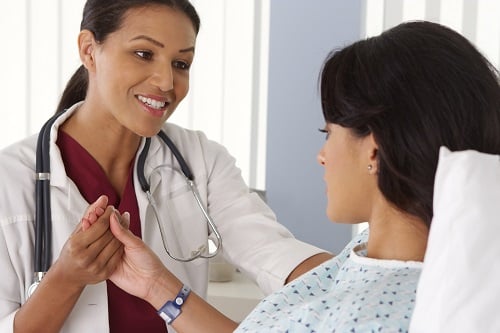
Pap Tests
Cervical cancer is the fourth most common cancer in women, and early detection is key.
- Age 21: Get your first Pap test, repeating every three years.
- Age 30: Start co-testing—getting a Pap test and HPV test together—every five years.
- Age 65: Talk to your doctor about your health history and if you can stop getting Pap tests.
Women who experience pain and anxiety during procedures like Pap tests have options at MetroHealth—and you should discuss any concerns with your provider.

HPV Vaccines
The HPV vaccine can prevent strains of HPV that cause cervical cancer. While it’s best to be vaccinated before you start having sex, women up to age 45 can be vaccinated. Your provider can recommend the best plan based on your needs.

Birth Control and Contraception
Good family planning is a part of women’s healthcare, and many birth control options can also manage common issues like irregular or heavy periods.
At MetroHealth, we will listen to your needs and can offer:
- Birth control pills
- IUDs
- Birth control implants, shots, patches and rings
- Tubal ligation
Comprehensive Women's Healthcare
When are teens ready to start yearly visits?
It’s important for teens to start a relationship with a women’s healthcare provider when they feel ready, as early as 13 years old.
Most teens will not need a pelvic exam in their first appointment. So, what happens in your first yearly visit?
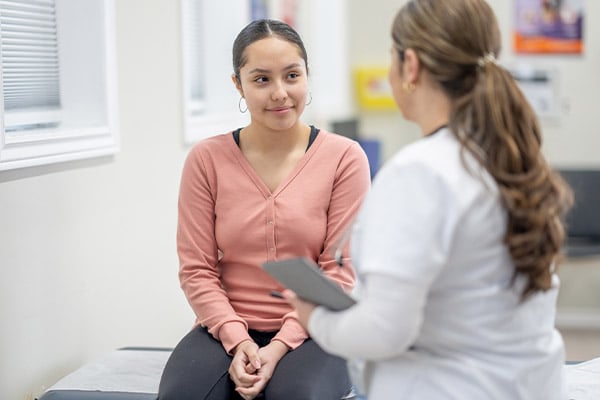
Ask Your Questions
Growing up is exciting—but it can also be confusing.
Your provider is here to give you honest, medically-accurate answers to questions that you may not feel comfortable asking anyone else—like questions about your body, growing up and sex.
Don’t rely on social media or friends—they don’t always have the truth. This is a time for you to understand what is happening and how you can be your healthiest.
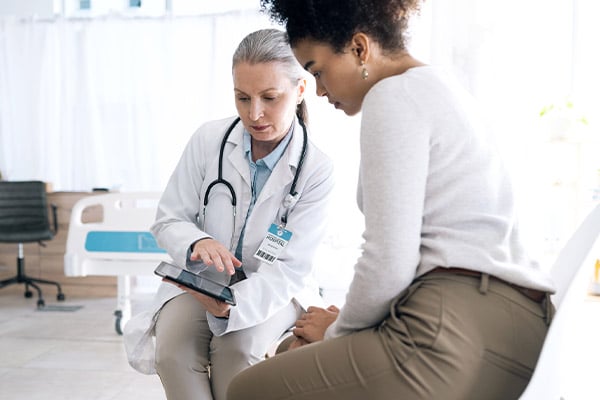
Share Information
Your provider will ask you questions about your family, body and any sexual activities you may have had or are thinking about.
It's a conversation just for you and your provider so they know how to best care for you and your needs.

Consider the HPV Vaccine
Your provider will recommend a HPV vaccine, if you haven’t already received the recommended doses. The vaccine prevents infection from HPV infections, or human papillomavirus, which is a common sexually transmitted infection. Some types of HPV can cause cervical cancer and other types of cancer in both men and women, so getting a vaccine before you start having sexual contact can keep you and others healthy.
No matter your pregnancy goals, seeing a women’s health provider throughout your child-bearing years is important to your health. At MetroHealth, these visits start with listening. We’ll talk about your birth control options, pregnancy goals and sexual history. And it’s not just about pregnancy.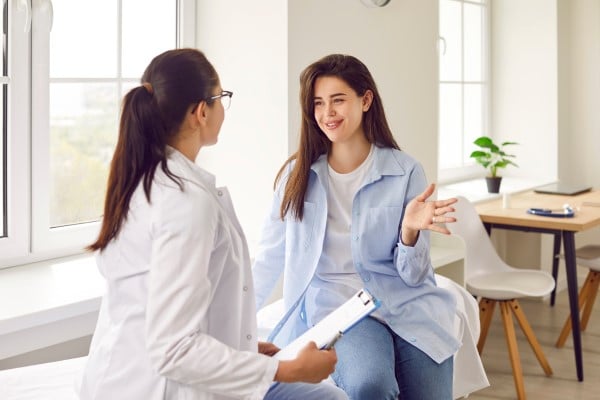
Women in child-bearing years can experience:
- Period irregularity
- Discharge
- Pain
- Ovarian cysts
- Polycystic ovary syndrome
- Endometriosis
- Pain with sex
- Urinary issues like leaking and going too much
Planning For Pregnancy

We’ll help you understand your ovulation cycle—and when you’re most likely to get pregnant. And, if necessary, we’ll connect you with our fertility services experts if there are issues preventing pregnancy.
Experts in Complex Family Planning
Seeing a MetroHealth provider means access to our new Complex Family Planning Clinic with board-certified specialists in full-spectrum reproductive healthcare. Through the Complex Family Planning Clinic, MetroHealth is improving access to contraception and family planning services for every person in our community.

Preconception Counseling
If you have serious medical conditions like cancer, heart disease or blood clots, or a history of difficult pregnancies, our providers can help you:
- Understand what pregnancy might look like for you
- Manage medications to help you achieve a healthy pregnancy

Contraception
Some women, especially women with serious genetic disorders or medical conditions, want to live a full sexual life without the risk of pregnancy. Our specialists offer specialized contraception including birth control medication options and complex IUD placements to prevent pregnancy in complex patients.
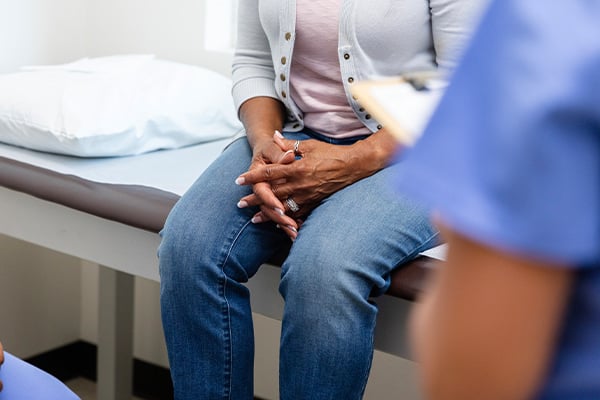
Early Pregnancy Management
Sometimes pregnancies won’t result in a healthy baby, including ectopic pregnancies, miscarriages and termination due to threat of maternal life, rape or incest. Our specialists will guide you through managing these issues, so you have the healthiest outcome.
Ask your provider if a referral to the Complex Family Planning clinic is right for you.
It’s important to continue to see a women’s healthcare provider throughout your life.
Most women experience menopause anywhere from 45 to 54 years old, and perimenopause—experiencing symptoms of menopause before a full year without a period—can happen earlier.

In this phase of your life, you should visit a women’s healthcare provider every year. While all women will eventually experience menopause, you don’t have to live with symptoms that interfere with your life like:
- Hot flashes
- Night sweats
- Trouble sleeping
- Fatigue
- Vaginal dryness
- Vaginal itching
- Heart palpitations
- Mood changes
Learn more about our specialized menopause services.
Post-Menopausal Women

Your yearly visit is an opportunity to discuss what you’re feeling, so you can be referred to specialty providers if needed. Common post-menopausal issues that may require specialized care include:
- Pelvic prolapse
- Urinary leakage, or going too often
- Vaginal itching, which may indicate vulvar cancer
- Bone issues, which may indicate osteoporosis